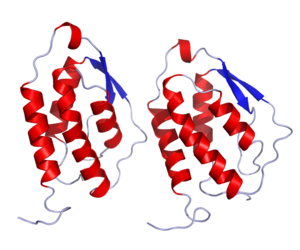A new use has been found for a protein that is produced by rheumatoid arthritis (RA) sufferers. The immune system produces a variety of attacking proteins, one of which is GM-CSF (Granulocyte Macrophage Colony Stimulating Factor), (I have already talked about testing CSF as an early indication if Alzheimer’s may be developing.)
GM-CSF (a synthetic version called Leukine) is used for cancer treatment. GM-CSF is part of the immune/inflammatory cascade system that helps patients generate more immune cells. While it was known that most RA patients do not generally develop Alzheimer’s, the “protection” was thought to be the result of NSAID (non-steroidal anti-inflammatory drugs) dosages taken to treat RA. However, new data from the University of South Florida determined that the “protection” results from GM-CSF.
The researchers administered GM-CSF to genetically altered mice (to develop memory problems that mimic Alzheimer’s). The also use normal (non-mentally challenged) mice. Both sets of populations were provided either GM-CSF or a placebo. Testing of memory and learning was started after ten days of the study (placebo or drug administration). After 20 days, those mice treated with GM-CSF demonstrated better memory and learning (similar to the mice without the genetically altered mental state). Even the normal mice performed better than those provided placebos. (Genetically altered mice given placebos performed poorly.)
Dr. Huntington Potter (lead researcher) postulated that GM-CSF augments microglia cell agglomeration (from the brain’s blood supply), which attack the plaques that are associated with Alzheimer’s. These macrophages (the microglia) attack damaged neurons and plaques in the brain.
When autopsied, the brains of the treated mice had a 50% decrease in beta amyloid (basic component of the plaque). They also found an increase in nerve cell connections (which may provide the basis for the augmented memory capabilities they found).
The next step that the institute (University of South Florida Health Byrd Alzheimer’s Institute) plans is to test the compound in humans with mild to moderate Alzheimer’s. Since the drug is already approved by the FDA, it renders this step less problematic than most new drug studies.








I read a similar study in Newseek where pressure was applied at the accupuncture points instead of placing the needles there.
It was found that when the patient had pressure applied to the points instead of having needles inserted in the points, the patient had the same amount of healing (or of feeling less pain) than when needles were inserted. The person who wrote the article assumed that this was because accupuncture didn’t work. An accupuncture practitioner or patient could have told you that what was tested was whether or not accupressure works as well as accupuncture. The article quoted here seems to indicate that using electicity was just as effective as using needles, not that needles were not effective.
Thanks friend. It has been fun hearing
Thanks man. This has been interesting hearing